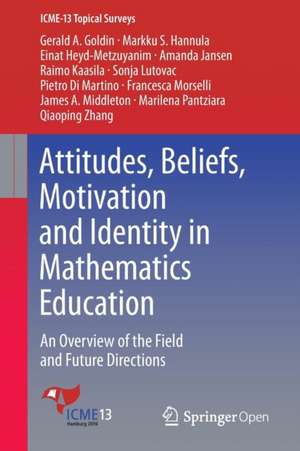Attitudes, Beliefs, Motivation and Identity in Mathematics Education: An Overview of the Field and Future Directions: ICME-13 Topical Surveys
Autor Markku S. Hannula, Pietro Di Martino, Marilena Pantziara, Qiaoping Zhang, Francesca Morselli, Einat Heyd-Metzuyanim, Sonja Lutovac, Raimo Kaasila, James A. Middleton, Amanda Jansen, Gerald A Goldinen Limba Engleză Paperback – 29 iun 2016
This book records the state of the art in research on mathematics-related affect. It discusses the concepts and theories of mathematics-related affect along the lines of three dimensions.
The first dimension identifies three broad categories of affect: motivation, emotions, and beliefs. The book contains one chapter on motivation, including discussions on how emotions and beliefs relate to motivation. There are two chapters that focus on beliefs and a chapter on attitude which cross-cuts through all these categories. The second dimension covers a rapidly fluctuating state to a more stable trait. All chapters in the book focus on trait-type affect and the chapter on motivation discusses both these dimensions. The third dimension regards the three main levels of theorizing: physiological (embodied), psychological (individual) and social. All chapters reflect that mathematics-related affect has mainly been studied using psychological theories.
The first dimension identifies three broad categories of affect: motivation, emotions, and beliefs. The book contains one chapter on motivation, including discussions on how emotions and beliefs relate to motivation. There are two chapters that focus on beliefs and a chapter on attitude which cross-cuts through all these categories. The second dimension covers a rapidly fluctuating state to a more stable trait. All chapters in the book focus on trait-type affect and the chapter on motivation discusses both these dimensions. The third dimension regards the three main levels of theorizing: physiological (embodied), psychological (individual) and social. All chapters reflect that mathematics-related affect has mainly been studied using psychological theories.
Din seria ICME-13 Topical Surveys
-
 Preț: 136.40 lei
Preț: 136.40 lei -
 Preț: 136.40 lei
Preț: 136.40 lei -
 Preț: 136.40 lei
Preț: 136.40 lei -
 Preț: 136.02 lei
Preț: 136.02 lei -
 Preț: 136.40 lei
Preț: 136.40 lei -
 Preț: 136.40 lei
Preț: 136.40 lei -
 Preț: 136.40 lei
Preț: 136.40 lei -
 Preț: 136.24 lei
Preț: 136.24 lei -
 Preț: 136.24 lei
Preț: 136.24 lei -
 Preț: 136.02 lei
Preț: 136.02 lei -
 Preț: 136.24 lei
Preț: 136.24 lei -
 Preț: 136.40 lei
Preț: 136.40 lei -
 Preț: 136.24 lei
Preț: 136.24 lei -
 Preț: 136.02 lei
Preț: 136.02 lei -
 Preț: 136.02 lei
Preț: 136.02 lei -
 Preț: 136.40 lei
Preț: 136.40 lei -
 Preț: 135.47 lei
Preț: 135.47 lei -
 Preț: 135.85 lei
Preț: 135.85 lei -
 Preț: 137.38 lei
Preț: 137.38 lei -
 Preț: 136.02 lei
Preț: 136.02 lei -
 Preț: 136.77 lei
Preț: 136.77 lei -
 Preț: 136.99 lei
Preț: 136.99 lei -
 Preț: 136.02 lei
Preț: 136.02 lei -
 Preț: 136.40 lei
Preț: 136.40 lei -
 Preț: 136.77 lei
Preț: 136.77 lei
Preț: 136.02 lei
Nou
Puncte Express: 204
Preț estimativ în valută:
26.03€ • 27.83$ • 21.70£
26.03€ • 27.83$ • 21.70£
Carte tipărită la comandă
Livrare economică 18 aprilie-02 mai
Preluare comenzi: 021 569.72.76
Specificații
ISBN-13: 9783319328102
ISBN-10: 3319328107
Pagini: 30
Ilustrații: VII, 35 p. 2 illus.
Dimensiuni: 155 x 235 x 2 mm
Greutate: 0.08 kg
Ediția:1st ed. 2016
Editura: Springer International Publishing
Colecția Springer
Seria ICME-13 Topical Surveys
Locul publicării:Cham, Switzerland
ISBN-10: 3319328107
Pagini: 30
Ilustrații: VII, 35 p. 2 illus.
Dimensiuni: 155 x 235 x 2 mm
Greutate: 0.08 kg
Ediția:1st ed. 2016
Editura: Springer International Publishing
Colecția Springer
Seria ICME-13 Topical Surveys
Locul publicării:Cham, Switzerland
Cuprins
Introduction.- Attitude.- Students’ Self-efficacy Beliefs.- Teachers’ beliefs.- Identity.- Motivation.- Further Reading on Mathematics Related Affect.
Recenzii
“This pamphlet is a review of the research literature published in the last decade related to the four themes in the title. The authors use these surveys to discuss historical shifts in the way researchers have approached the themes, to point out gaps in the literature, and in some cases to advocate for future research directions. The intended audience is active researchers working with these themes, and I think it would help this group move their research agendas forward.” (Brian P. Katz, Maa Reviews, maa.org, October, 2016)
Textul de pe ultima copertă
This book records the state of the art in research on mathematics-related affect. It discusses the concepts and theories of mathematics-related affect along the lines of three dimensions.
The first dimension identifies three broad categories of affect: motivation, emotions, and beliefs. The book contains one chapter on motivation, including discussions on how emotions and beliefs relate to motivation. There are two chapters that focus on beliefs and a chapter on attitude which cross-cuts through all these categories. The second dimension covers a rapidly fluctuating state to a more stable trait. All chapters in the book focus on trait-type affect and the chapter on motivation discusses both these dimensions. The third dimension regards the three main levels of theorizing: physiological (embodied), psychological (individual) and social. All chapters reflect that mathematics-related affect has mainly been studied using psychological theories.
The first dimension identifies three broad categories of affect: motivation, emotions, and beliefs. The book contains one chapter on motivation, including discussions on how emotions and beliefs relate to motivation. There are two chapters that focus on beliefs and a chapter on attitude which cross-cuts through all these categories. The second dimension covers a rapidly fluctuating state to a more stable trait. All chapters in the book focus on trait-type affect and the chapter on motivation discusses both these dimensions. The third dimension regards the three main levels of theorizing: physiological (embodied), psychological (individual) and social. All chapters reflect that mathematics-related affect has mainly been studied using psychological theories.
Caracteristici
Provides an up-to-date overview of research on affect in mathematics education Offers a broad introduction to different dimensions and categories of affect Includes suggestions for further reading Includes supplementary material: sn.pub/extras




